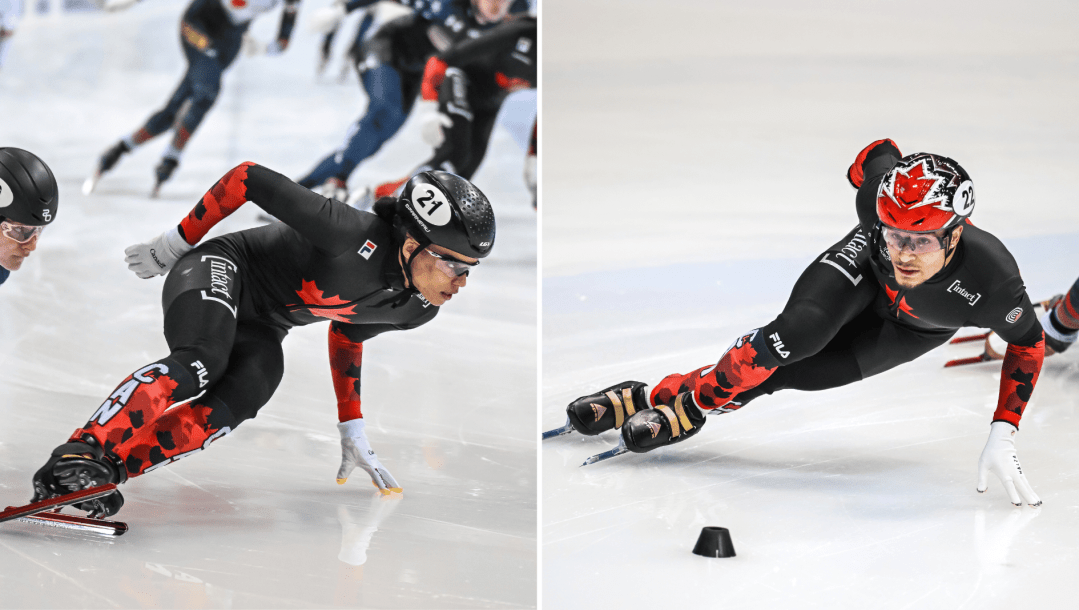Jordan Pierre-Gilles and Renee Steenge have big goals as they skate into Canada’s short track spotlight
Short track speed skaters Renée Steenge and Jordan Pierre-Gilles are part of a formidable national team featuring 16 of Canada’s fastest skaters.
Steenge made it to the podium at her first ISU World Championships in Seoul, South Korea in March 2023, winning bronze as part of Canada’s women’s 3000m relay team. As a first-time Olympian, Pierre-Gilles struck gold with Team Canada’s men’s 5000m relay at Beijing 2022.
The 2023-24 competitive season is proving to be a time of discovery and athletic breakthroughs for both short track speed skaters.
In 1992, short track speed skating became an official Olympic sport. Skaters sprint around a 111.12-metre oval using every trained muscle to resist the immense centrifugal force trying to pull them off the ice, all while moving forward and at great rates of speed. Elite athletes make it look easy.
Steenge credits her success on the ice to mind, blade, and ice syncopation.
“There’s a nice flow and rhythm to it. That’s what I feel at this level,” she explained. ”I’m really in tune with my blades and the ice. When you’re peaking and you feel good physically it really translates on the ice. You feel good. You glide.”
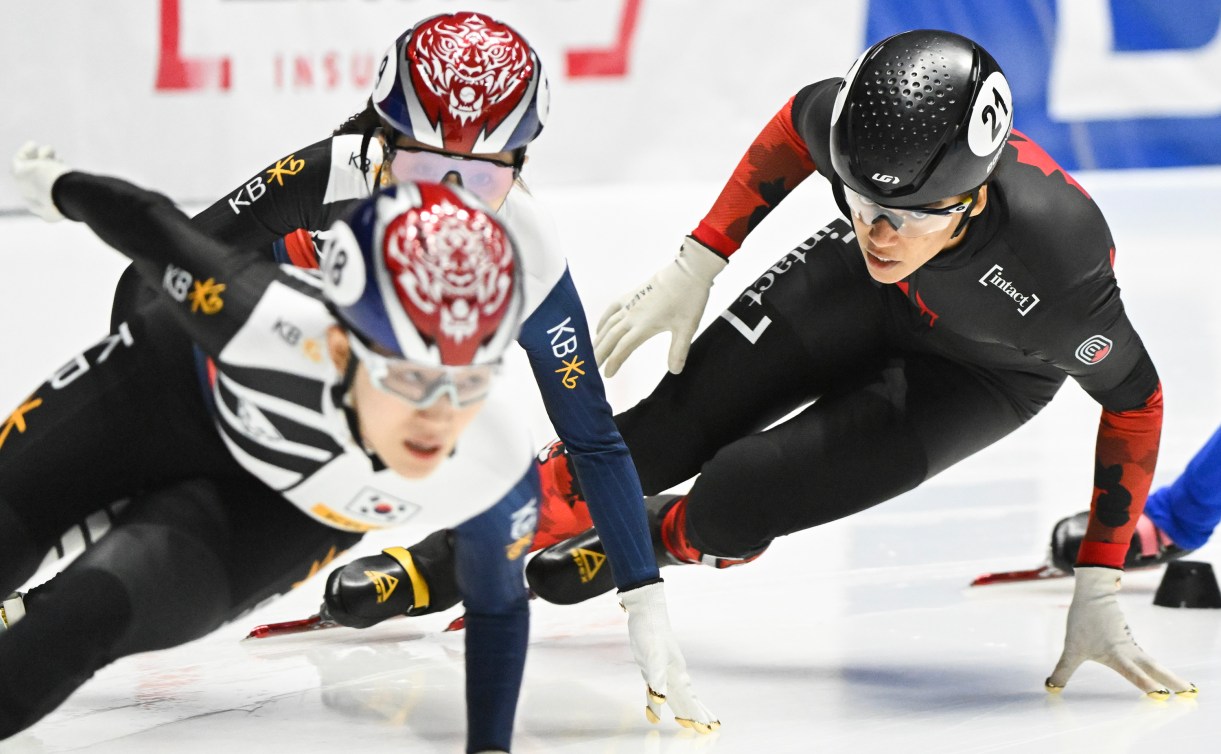
Time on the ice is not always a smooth experience for Steenge. Following her team’s 3000m relay gold medal performance at World Cup competition in Montreal this past October, she returned to the track lacking that flow.
“I just wasn’t flowing very well on the ice but you have to trust your coaches and your training program. I really like routine and structure, so if I ever stop feeling at ease on the ice I go back to doing the same warm ups, the same activations, to try and get my body to feel the same way every day.
“We have really good coaches and technical staff. Our technical coach takes care of our blades and he’s really good at that. You just talk to him, talk to more coaches and you get ideas to see how you can get back to being on top but you have to trust that it will all come together in the end.”
As an eight-year-old when Streenge first took to the oval ice track, relays and drills dominated her training routine.
“When I was younger, my mother got my brother and I involved in so many sports with the city of Brampton (Ontario). She registered us for volleyball and swimming lessons and then we started hockey but we didn’t particularly enjoy that and then she saw speed skating at one point. She signed us up, we tried it and we really liked it. It was a really good community, really good coaches and everyone was really welcoming, so we continued.
“It was fun. We never did laps. It was all relays and drills, weaving in and out of the blocks and jumping on mats. It wasn’t too structured.”
Steenge has grown to embrace structure, through regimented training sessions and demanding university classes. An outstanding student-athlete – she was recognized with the Peter Williamson Memorial Bursary from Speed Skating Canada for 2022-23 – Steenge moved from Brampton to Montreal to train with the national team and pursue a degree in Engineering at McGill University. When she’s not on the ice or in class she builds wooden houses as a creative and exploratory outlet.
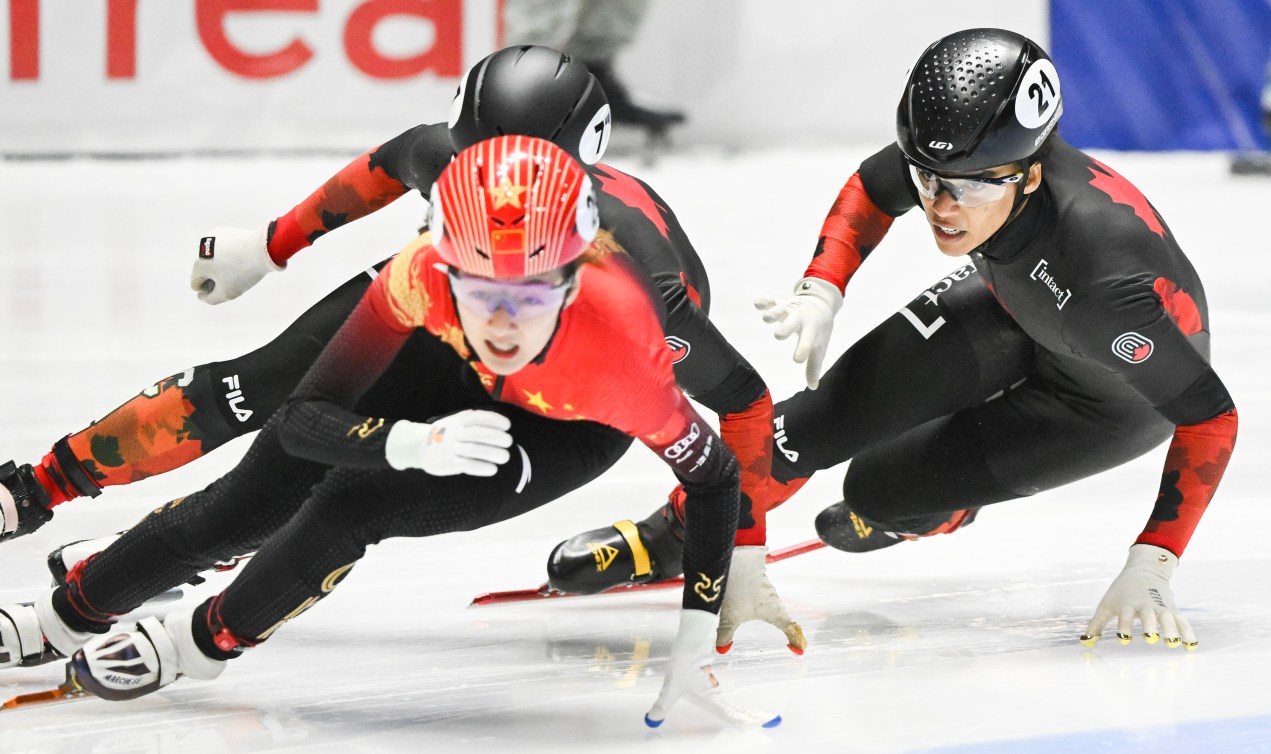
“I build miniature houses made out of wood, it gets my creative side going. When I’m travelling I actually really like looking at the structure of buildings. I studied civil engineering, so I’ll take lots of pictures. I love the Netherlands! It’s my favourite place to go. I completely love brick structures and houses and they have them everywhere.”
But don’t look for Steenge’s pics on her Instagram account; she doesn’t have one. Steenge prefers human connection instead of digital.
Steenge is laser focused on improving her performance in individual races and has her sights set on competing in her first Olympic Games in 2026. In spite of the pressures of international competition she relishes time spent with her relay teammates.
“The six other girls that I train with are so tenacious. I think that’s such a good quality to have. They are really disciplined and ambitious. They are genuinely nice people and it’s so much fun to be around them.”
Asked how life on the ice has shaped her overall outlook on life, she pensively replies:
“If I never make it to the Olympics, or another world championships, who do I want to be at the end of this? I guess that drives me to keep going. I see being on this path has me becoming more disciplined and I’m pushing my limits physically.”
Steenge firmly believes in including the next generation of speed skaters in the overall national fold and is determined to ensure she contributes to an atmosphere of positive growth for those who follow.
“If it’s something you enjoy, keep going.”
Olympic gold medallist Jordan Pierre-Gilles – named after arguably the greatest basketball player of all time, Michael Jordan – has set his mind on becoming the fastest 500m short track speed skater on record.
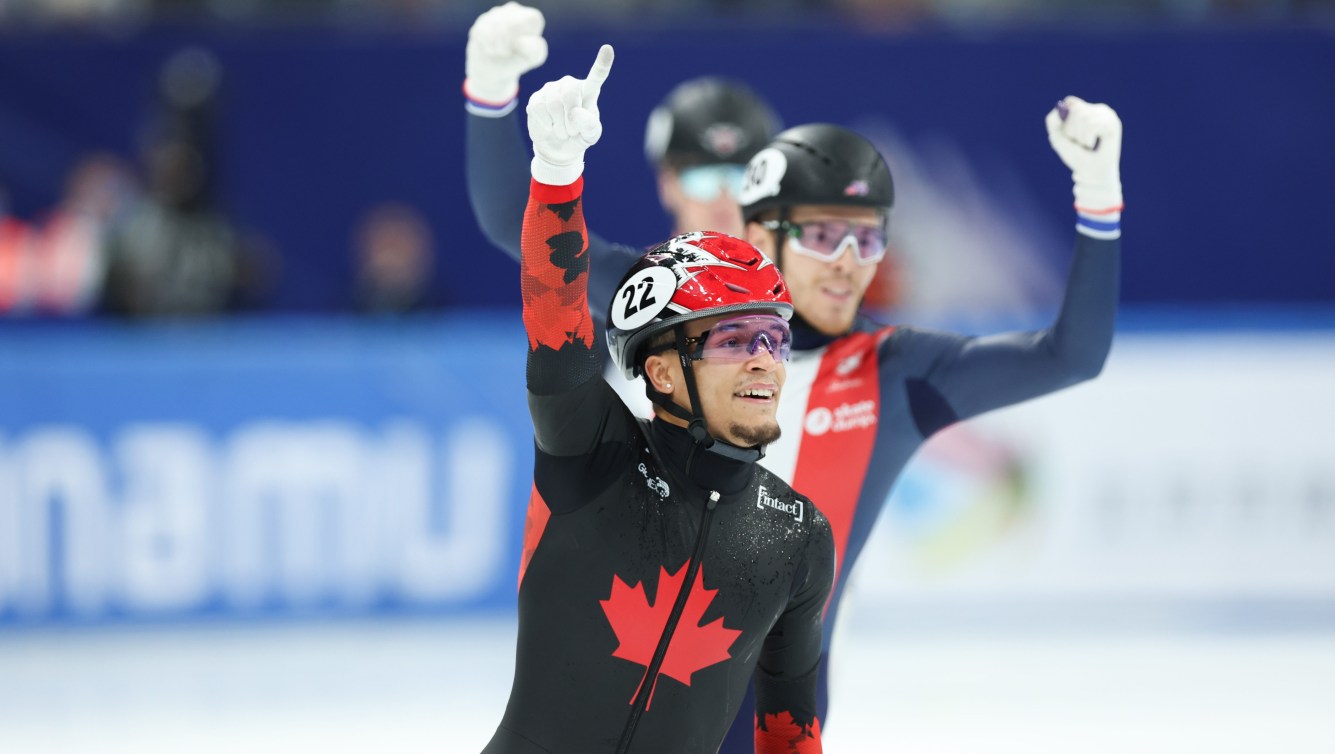
“I’m not in my prime yet. I’ll put in the work to reach it. I know for a fact I will be in my prime in a couple of years. My ultimate goal would be to be world and Olympic champion in an individual event and have a world record in the 500m.”
Born into a soccer family in Sherbrooke, Quebec in 1998, the top man in this season’s 500m World Cup standings grew up playing soccer. As a kid, Pierre-Gilles’ dream was to be a pro soccer player like his dad. His plans changed at the age of 17 when his father recognized his immense talent on the oval track and encouraged him to pursue elite speed skating.
“I had great conversations with my dad. He told me, ‘I see you skating and I know what you can achieve.’ Once he told me that and trusting him and my mom, it helped me decide to choose skating.”
This World Cup season, Pierre-Gilles has amassed three gold medals and a silver in the 500m and helped Canada win three gold and a silver in the 5000m relay.
His season’s goals: to be crowned the world’s top individual 500m skater and bring home more hardware with the Canadian relay team. Extensive travel is required to attain the aforementioned goals. To stay focused, Pierre-Gilles, whose mom is Quebecoise and dad is Haitian, finds refuge in music which he uses as part of his pre-race routine.
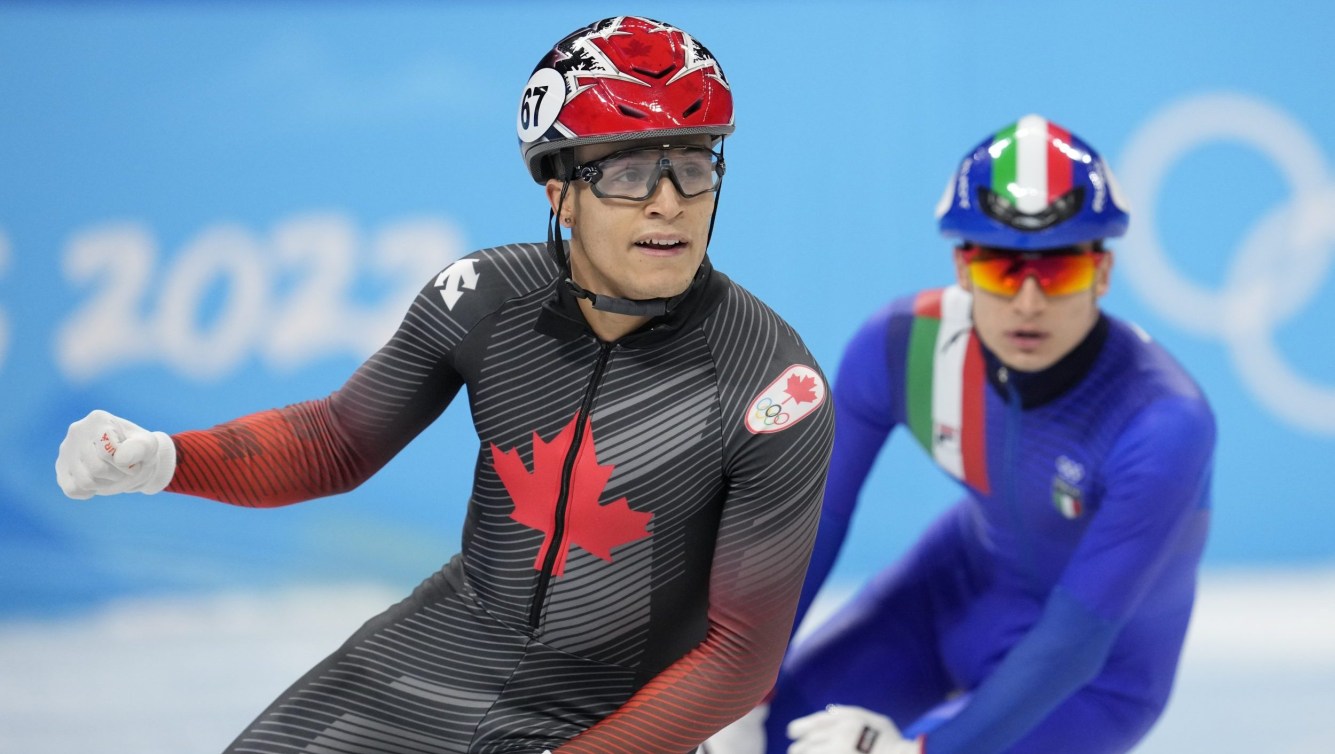
“Music is one of my passions. It’s been my hobby for the past almost 10 years. I’m a big music fan. I’ve studied music and try to learn from artists from every generation. I collect vinyl records and I have a turntable. I go to a lot of concerts with my group of friends. As a teenager and still to this day, my favourite artist is rapper Kendrick Lamar. I love Erykah Badu as well. It’s a completely different vibe but when I’m alone I vibe a lot to Erykah Badu, The Roots, a lot of jazz with Louis Armstrong and Ella Fitgerald. I have a wide range of artists that I enjoy. I love old school rap like Outkast too.”
Bouncing back from injuries last season, Pierre-Gilles has declared he’s “all in” with his commitment to excellence on the ice. He focuses on the things he can control and likes to keep his approach to racing simple.
“Obviously I feel nervous, sometimes. But for me, the closer I get to the race the less nervous I become. I don’t feel intimidated. It’s not really a part of who I am as an athlete.”
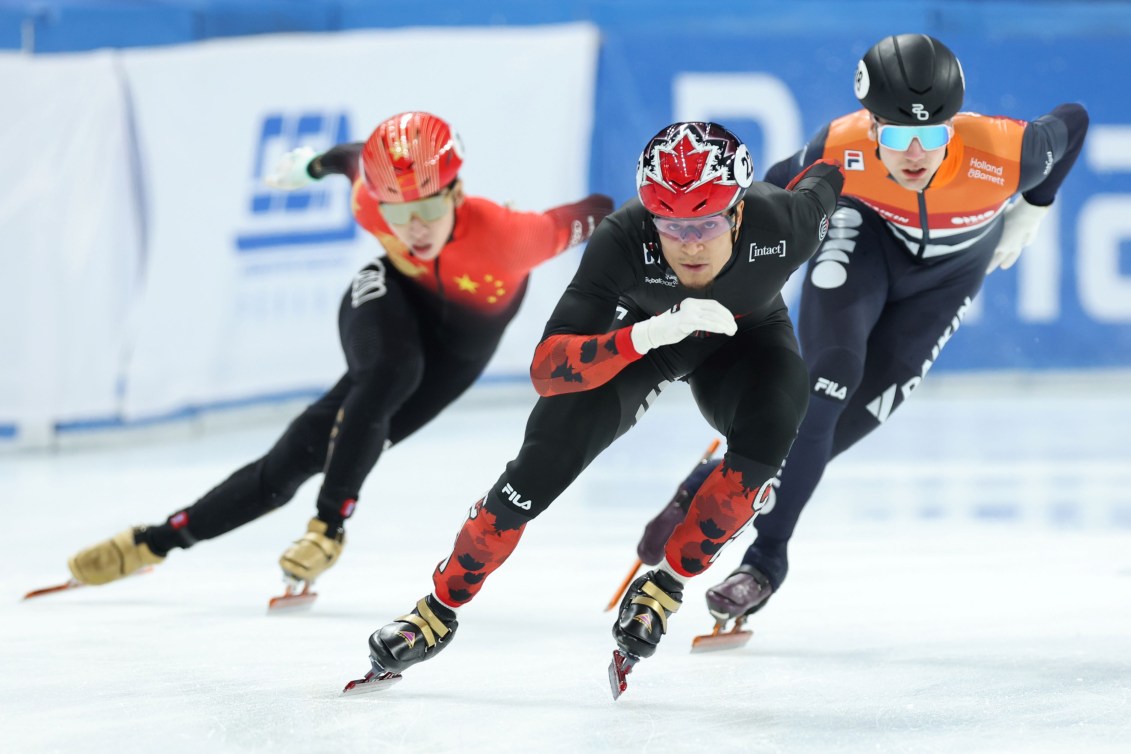
Unlike teammate Steenge who is not on Instagram, Pierre-Gilles expresses his true self in the digital space. Whether it’s a joyous moment or a difficult time, Pierre-Gilles says posting helps him reflect and see how far he’s evolved physically and emotionally.
Diversity in the sport of short track speed skating is increasing in Canada. As one of four athletes of colour on the national team roster of 16, Pierre-Gilles takes pride in his Haitian/Canadian heritage and brings that pride to the oval everyday.
“I have never experienced racism in skating. It’s a welcoming sport. When I started skating there weren’t a lot of Black kids in the sport, but I saw it as a motivator. I know my ancestors, my grandma and my granddad made a lot of sacrifices for me to be able to have these opportunities so I want to honour them. Just knowing that I’m one of the only Black Canadians to ever win an Olympic gold (at the Winter Games) is something that I’m extremely proud of and I would say to kids of colour coming up in this sport, don’t see your race as a barrier. The more we move through time we see that colour is not a barrier. I feel like whatever your colour or background, it’s really your motivation and your discipline that’s going to help you be who you want to be. Don’t let any hurdles stop you. There’s always going to be people who will support you. So, go for it.”
Following the successful conclusion of the ISU World Cup season, the focus for the Canadian team will be the ISU World Short Track Speed Skating Championships taking place March 15-17 in Rotterdam, Netherlands.

